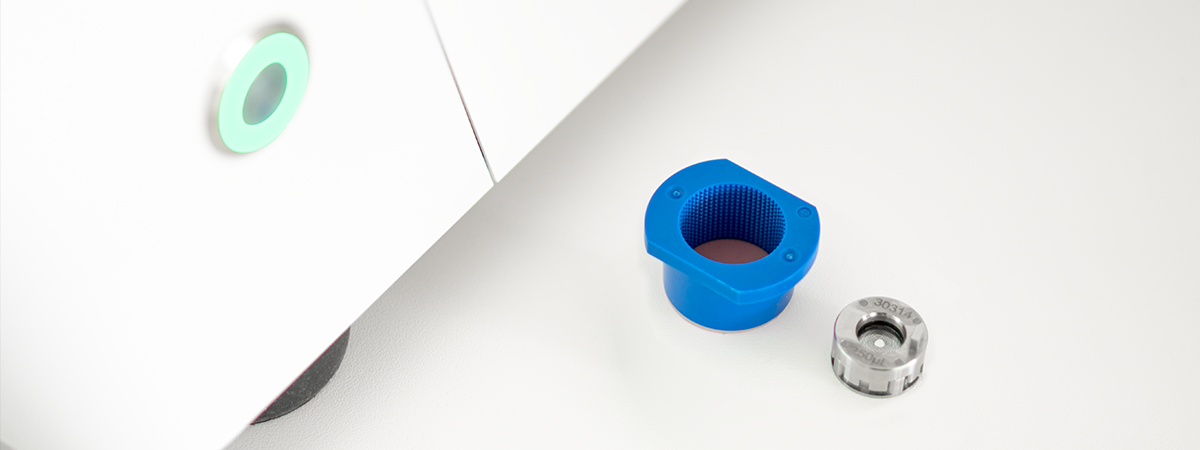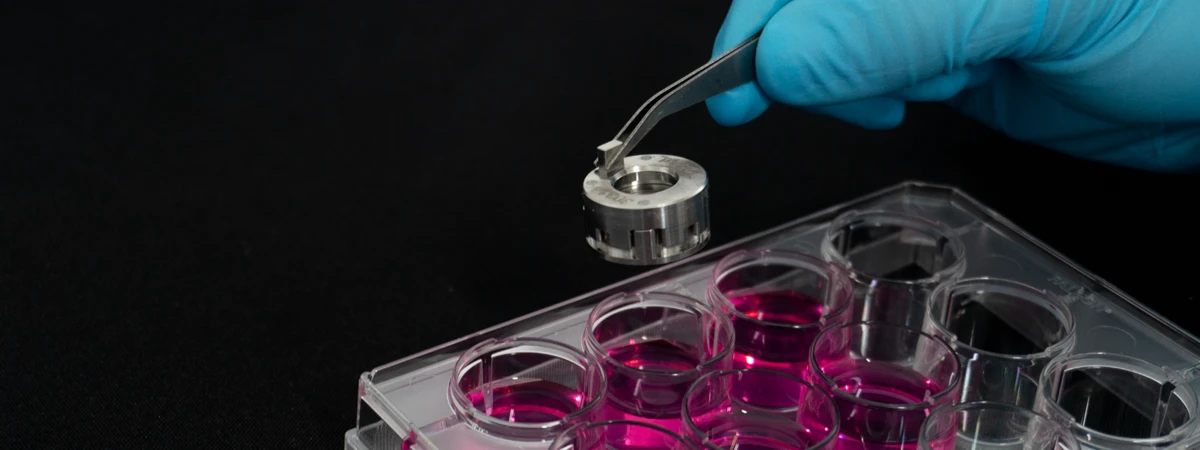NON-DESTRUCTIVE, CONTACT FREE MECHANICAL TESTING OF
µ-VOLUME BIOMATERIALS
µ-Volume Sample Holder for ElastoSens™ Bio
The µ-Volume Sample Holder for ElastoSens™ Bio was designed for biologists and chemists
The µ-Volume Sample Holder of the ElastoSens™ Bio was specifically designed for applications in which sample volume is limited such as blood coagulation, biomaterials (hydrogels) and tissue engineering.
All the pieces needed for preparing and holding the sample as well as the adaptor to the ElastoSens™ Bio are autoclavable. They were designed for an easy manipulation with the assistance of sterile tweezers or by hand. The µ-volume sample holder is reusable and easy to clean.
The sample holder containing the sample can be stored in a 12-well plate with culture medium, saline solution, or other media, and tested multiple times over time.
TISSUE ENGINEERING
Capture the slow growth of tissues by testing the mechanics of 3D cell cultures over long periods of time
3D BIOPRINTING
Print micro volumes of bioink inside the µ-volume sample holder and test the mechanics of 3d printed scaffolds.
FORMULATION OF HYDROGELS
Accelerate discovery by rapidly screening the mechanical properties of candidate formulations.
NON-DESTRUCTIVE, CONTACT FREE MECHANICAL TESTING FOR BIOLOGISTS AND MATERIAL SCIENTISTS
We designed the µ-Volume Sample Holder of the ElastoSens™ Bio for tissue engineering and biomaterials. Biologists and material scientists can test the mechanical properties of soft tissues and biomaterials while still taking advantage from the ElastoSens™ Bio unique capabilities:
- Test the mechanical properties of 250µL samples;
- Test under sterile conditions: autoclave the µ-Volume Sample Holder and test on the ElastoSens™ Bio inside the flow hood;
- Test the mechanical properties of sterile samples without contact thanks to the vibration-based technology of the ElastoSens™ Bio;
- Use a non-destructive mechanical testing instrument to keep the sample safe and undamaged after repeated tests over time;
- Retest the same biological sample over time and keep it sterile between tests.
µ-VOLUME SAMPLE HOLDER: A NEST FOR SOFT AND FRAGILE ENGINEERED TISSUES
How to use the µ-volume sample holder for ElastoSens™ Bio?

START MASTERING THE MECHANICS OF TISSUES
How to get the µ-Volume Sample Holder?
please contact us:
CASES STUDIES
How to measure the enzymatic degradation of tissues and organs using the ElastoSens™ Bio?
Enzymes are commonly used in the field of regenerative medicine to degrade native tissues for the extraction of cells and other components, or as a part of physiological-like fluids to mimic in vivo conditions for biomaterials in development. The performance of enzymes can be measured in terms of weight loss or mechanical properties. The viscoelastic properties of kidney tissue during incubation with collagenase was precisely measured using the ElastoSens™ Bio...
How do the µ-volume and the macro-volume sample holders of the ElastoSens™ Bio compare?
The μ-volume sample holder was developed as an alternative to the macro-volume sample holder for projects where sample volume is restricted. Due to the non destructive nature of the technology, the sample can be kept in both sample holders and retested multiple times to follow the mechanical profile over time of the sample in controlled environments. One important difference is that the μ-volume sample holder was designed to fit in a 12-well plate for easy sample incubation, and completely autoclavable (made of stainless steel) to better maintain sample sterility cellularized hydrogels ...
How to introduce a sample into the µ-volume sample holder of the ElastoSens™ Bio?
The ElastoSens™ Bio is a compact analytical instrument that measures the viscoelastic properties of soft materials following easy and quick steps guided by the Soft Matter Analytics™ App. Prior to testing, the sample to be measured needs to be inserted into the available sample holders specifically designed for the ElastoSens™ Bio. This step plays a key role in ensuring the quality of the data obtained from the instrument. The μ-volume sample holder was developed for applications in which sample volume is limited, such as for natural polymers, blood and plasma ...




